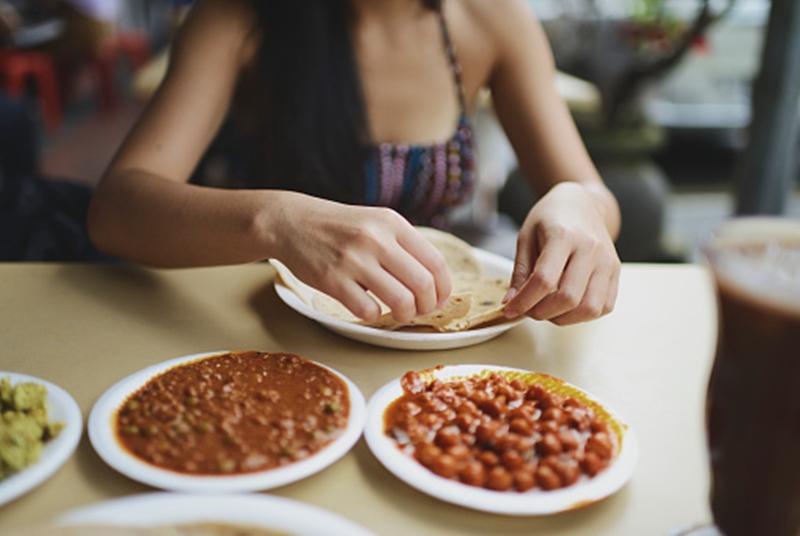Experts have urged people to add chickpeas to their diets, claiming it could help slash cholesterol levels, controls diabetes and improve digestion among other benefits.
It is believed that chickpeas originally come from the regions surrounding what is now Turkey, but its consumption expanded to such an extent that it is produced in more than 50 countries. Currently, most of it is grown in India and Mexico.
The importance of chickpeas consumption is such that they have a high content of vegetable protein and they are a source of minerals such as calcium, iron, magnesium, potassium and phosphorus. As for their contribution of vitamins E, thiamine, niacin and folates stand out.
“A serving of chickpeas covers 31% of the recommended intake of folates”, indicates the institution. It also emphasises their fibre content – soluble and insoluble – which favours intestinal transit and combats constipation.
More than “a legume”: benefits of chickpeas
It is an essential ingredient in typical dishes of Mediterranean, Arabic, and Indian cuisine. It is mainly consumed in the form of hummus, falafels, dhals, and curries. But despite how tasty it is in recipes, eating it provides health benefits such as glucose balance, better nutrient absorption, good digestion, and more energy, among others.
“It provides macronutrients such as carbohydrates, which are excellent quality proteins, and a lot of fiber. Regarding micronutrients, it should be noted that it contains a large part of the vitamins B complex and vitamin K, which are essential for bone and metabolic health,” reveals Estela Mazzei, a specialist in plant-based nutrition , digestive and cardiometabolic health.
Source of protein
When asked about the belief that chickpeas cannot be considered a source of protein due to their lack of amino acids, Ms. Mazzei explains: “It is one of the most complete legumes. Before, it was believed that they did not have the same amount of amino acids as eggs, but what happens is that people do not take into account that, in addition to providing good quality, they satisfy the basic protein values.” She then adds that another myth surrounding the food is that it should be consumed with cereals, “but it has already been proven that this is false and that animal protein is not needed to have this complete indicator,” she says.
Lowers cholesterol levels and reduces weight
The study “Chickpeas and human health: the effect of chickpea consumption on some physiological and metabolic parameters” shows that these legumes have the ability to be a perfect complement to the diet thanks to the fact that including them in the daily intake reduces body weight and lowers cholesterol levels.
“Scientific evidence has shown that it is possible to reduce total cholesterol by adding chickpeas to main meals. Soluble fiber is good for more than just intestinal health, it reduces total cholesterol and LDL (“bad”) cholesterol, which also decreases the risk of heart disease,” reports the health website WebMD.
Controls blood glucose levels
Lic. Mazzei indicates that it is a great food for diabetics since it prevents glucose spikes. According to her, this is due to its fiber content that slows down the process of nutrient absorption from the blood, avoiding imbalances or “spikes” in blood sugar levels. As far as quantities are concerned, the recommendation is 20 to 25 grams per day for women and 30 to 38 grams for men.
Improves digestion and nourishes intestinal flora
They help prevent constipation and promote regularity for a healthy digestive system. As for the belief that legumes trigger heavy digestion or flatulence, Mazzei explains: “If one does not soak and cook legumes correctly, bacteria ferment in the intestine, which causes gas or indigestion.” On the contrary, exposing them to water for 24 hours, then cooking them and adding lemon juice prevents symptoms of constipation and poor digestion, and they also triple in size. One thing to keep in mind? “Adding bay leaves or cumin during cooking improves digestion because they are stimulating substances,” suggests Lic. Mazzei.
The study “A diet supplemented with chickpeas alters the intestinal microbiota and improves the integrity of the intestinal barrier in male mice” published in the Journal of Functional Foods shows that this food positively modifies the microbiota as well as the intestinal structure, thus being able to favor the prevention of diseases associated with the intestine.
If you are not used to eating chickpeas and you consume them in large quantities and all at once, the specialist warns that it can cause stomach upset. In response to this, she suggests accustoming your palate little by little and with easier-to-swallow forms such as hummus, pasta or chickpea flour.
As for contraindications, it specifies that people undergoing treatment for specific pathologies such as intestinal bacterial overgrowth (SIBO), irritable bowel syndrome (IBS) or any stomach upset should temporarily remove legumes from their diet.





